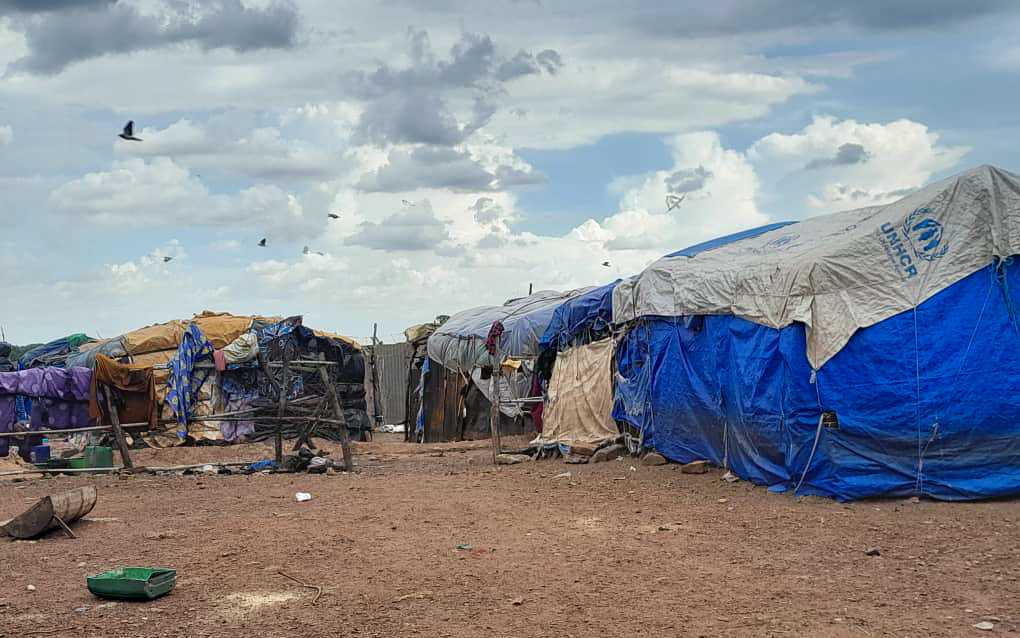10/7/2023. Soon after midnight I received a WhatsApp voice message from ‘Mamadou Fette Sambo’ – the name under which I saved his phone number during my last visit to Mali two monts prior. He shares his morning wishes in Fulani style and asks me to bring him a new phone, a Tecno, the next time I am in Mali. I saw Mamadou in Bamako in May. He had a thin, slender body, clothed in a long worn out jellaba. His face showed the wrinkles of a life in the bush without luxury. I can imagine him walking with a large cattle herd from the markets in the rural areas towards the capital city of Bamako, where the meat from Fulani cattle serves as the urbanite’s high-quality food.
I met Mamadou at the house of the son of my old friend Aisata, at the outskirts of Bamako. Aisata was the assistant during the fieldwork I did together with Han van Dijk in the Hayre-Seeno region, central Mali in the early 1990s.1 Back then Han and I met Mamadou for the first time while visiting Fette Sambo, one of the several cattle camps that is part of the larger constellation of camps called Serma (south of the town of Boni). I remember Mamadou and Aisata offering us roasted goat meat. Now, in 2023, the 1990s seem far away, but during the meetings I have in Bamako with people from the Hayre-Seeno region, lively flashbacks pop up from time to time.

Central Mali where Fulani men cannot travel without risk.
In March 2022, Aisata was in Bamako to undergo cataract surgery. Against the wish of her son, who is a teacher in Bamako, she returned to Boni, a market town in the Hayre-Seeno region in central Mali. In Boni the Malian army has its basis from which they fight jihadi groups with the help of the Wagner forces – consisting of Russian mercenaries. The jihadists have occupied a large part of the region. Since the Wagner group came to Boni, violence against civilians has increased. A report by Human Rights Watch explains how violence against civilians has risen in central Mali since the arrival of the Wagner group and the simultaneous departure of the French military. No wonder Aisata’s son didn’t want his mother to return to Boni. It’s just not safe. The Malian government claims to fight a war against terrorists. Who these terrorists exactly are is not quite clear. In Central Mali they are associated with Katiba Macina, a jihadi group that first appeared on the scene as the Macina Liberation Front. The group joined a regional Al Qaida consortium in 2017. In the Hayre-Seeno region, Katiba Serma, as a sub-division of Katiba Macina, dominates the jihadi scene. Katiba Macina is led by Hamadou Kouffa, a famous Muslim singer in the inner delta of the Niger river who turned into a gifted preacher for the cause of Katiba Macina. He directs his sermons specifically to his Fulani kinsmen, in Fulfulde, the language of the Fulani. The imagery of the Fulani jihadist became popular in the public sphere. A ferocious debate arose around what became known as La Question Peule, the conflation of jihadists with the Fulani. Today this debate continues on social media platforms, especially among youth in the south of Mali. 2 The fact that many members of other ethnic groups have joined the jihad as well is neglected in this public imagery of the jihadi terrorist. During the interviews I had with people who fled the Middle Belt because of the violence, stories about these so-called terrorists turned out to be diverse. They show diversity both in reasons to adhere to these groups as well as in the (ethnic) affiliation of the adherents. The story of Mamadou is an example of this.
Dominated by fear
Mamadou arrived in Bamako in May 2023, in search of safety. He fled his camp out of fear. What does this fear (cuusal) mean? He explained that many Fulani men in the Hayre-Seeno region are afraid of both the army and their white allies, and the armed jihadi groups.
Mamadou’s home camp Fette Sambo is de facto controlled by Katiba Serma. He explains that they are the ones who come to collect the Zakat, a form of islamic almsgiving or tax. They also impose the clothing prescriptions: men have to wear a beard and islamic trousers; women have to be veiled. And they impose a lifestyle that forbids cigarettes, accepts arranged marriages, does not allow music and dance, and imposes praying in the style of Salafi Islam. Mamadou is an inveterate smoker – he never quitted smoking – but now he has to do it secretly.
Since January 2022, the Malian army teams up with the Russian mercenaries, who visit Fette Sambo now and then. They come to acquire information about the whereabouts of jihadi groups. They are dangerous, says Mamadou. Once he saw them passing Fette Sambo on their way to Yaraama, where a deep well provides water for cattle and households the whole year round, and hence pastoralists are there with their cattle. The soldiers returned with two men whom they arrested first and killed thereafter (be kirsi, that is beheaded) close to Fette Sambo.
Mamadou feels trapped. He is afraid of being accused by the jihadi groups of being a traitor, and by the army and their white allies of being a jihadist. In both cases it is death that awaits him. His only option was to leave. He left his young wife and his three young children behind in Fette Sambo. He hopes they will not be attacked. In the camp, life is not too bad in terms of food, he says. They had a good millet harvest and there is enough pasture for the animals. Nonetheless, life is dominated by fear.
Serma under a jihadi joke
Mamadou does not adhere to the jihadi groups, nor their actions or ideology. He does know some jihadi’s though, and the local leader of Katiba Serma, Muusa Hima, visits Fette Sambo regularly. Together they discuss all kinds of matters. Muusa Hima is from Yaraama and approximately 50 years old. On one occacion, he came to warn Mamadou’s uncle to no longer smoke. If the jihadi’s would see him smoking, punishment would be harsh.
Muusa Hima is one of the few people of Serma who is part of the armed groups, says Mamadou. He only knows of a few other youngsters who joined the jihadi groups, either coming from Fete Sambo or from other camps in Serma. Mamadou maintains that many of these young men who joined Katiba Serma are from other Fulani lineages than those from Serma, or they belong to entirely different ethnic groups altogether. Mamadou mentions the Toloobe from Niger, the Jelgoobe from Burkina, and also what he calls Boko Haram who come from Nigeria. Humbeebe (a derogatory term for Dogon), Bambara and Songrai also joined the ranks of the jihadis. He recalls how it all started, when the state abandoned the region in 2012, and the jihadist group MUJAO 3 occupied the region. At that moment, the Fulani felt obliged to take control in their own hands as the insecurity in the region increased. Young Fulani men bought arms and went to MUJAO camps to learn how to fight. They returned to their own camps and formed self-defense groups. Mamoudou remembers participating in a large gathering named Battu Mawdu, that took place in Serma in 2015. They discussed the mounting insecurity and absence of the state in the Hayre-Seeno region. They had hoped to get help from the government to restore calm in the region, but nothing happened. Some of the young men who were trained by MUJAO continued to fight with jihadist groups. The jihadist group of Katiba Serma, as a sub-group of Katiba Macina, was first mentioned in reports and in the media in 2018. As a group they also incorporated the earlier self-defense initiatives in the Hayre-Seeno. Mamadou says that he does not really understand their adherence to the extreme Muslim ideology. He saw these young men joining MUJAO and later other armed groups. The young men were attracted to these groups because they were given money and it added to their social standing. Along the way they were taught the jihadist ideology. Mamadou does not believe in one “true” Islam. He explains that religion is between the individual and Allah. Deciding to pray or not is your own responsibility. Later in a group interview he and his comrades, who also fled the region, say that praying is for the poor. When you own a lot of cattle you don’t have time for such things.
Travel
It is not the first time that Mamadou travels this far from his camp. When he was young he went to many West African countries, in search of work and money. He took cattle from rural areas to big cities, even as far as from Conakry at the Guinean coast; and he worked in several gold mines. He tells me how he went into the tunnels to dig for gold. That is also why he did not start a family earlier. He was moved around too much, like many Fulani men. His brothers took care of the cattle in Fette Sambo, while he was on adventure. He married and divorced four times and had no children until he married his present wife, about ten years ago. They have three young children. His wife is a daughter of the sister of his mother, a bibbe yaaya, the closest family tied marriage that the endogamic cattle Fulani practice. During the dry season, Mamadou came to Bamako regularly to work on the farm of Minister Dicko who has roots in his region and belongs now to the sedentary Fulani elites. These elites often hire cattle Fulani to take care of their cattle farms.
Nowadays there is no activity anymore at Dicko’s farm but the building rather serves as accommodation for Mamadou and others who fled their camps in Central Mali. The housekeeper, though of an empty and dilapidated farm, is a Dimaajo, a social category in Fulani society composed of former slaves, from Beebi (a village close to Boni and Serma). His home is open for his brothers who moved to Bamako and with whom he worked on the farm during better times. Mamoudou’s most recent journey to Bamako is different from those in the past. Back then, he was free to return to his camp and bring money home to buy cattle. Now he cannot return anymore, and he rarely finds an opportunity to work. Women can still take the bus to and from Bamako, nevertheless risking landmines and attacks of armed groups. As a man, Mamadou could not choose this option. Chances to get arrested and killed, either by the jihadi groups or by the army are too big.
When Mamadou traveled to Bamako most recently he had to take a dangerous road to bypass the patrols of the jihadists, of the Fama/Russians, and of milices affiliated with Dogon who are fiercely anti-Fulani. On the back of motorcycles they traversed the “brousse” on dirt roads to avoid the checkpoints. This voyage is expensive and dangerous.

House next to the abandoned farm of Dicko on the outskirts of Bamako, where villas of the rich rise. © Vera Bakker
Mi cuusi
Here in Bamako, Mamadou does not yet have a sufficient income. He hangs around on the cattle market in the outskirts of Bamako. “If the calm returns, I will go back”, he says, “but now I cannot, mi cuusi (I am scared)”. He is planning to get his wife and three young children over to Bamako. His cattle may follow, like the cattle of many Fulani from Serma. Many Fulani are no longer able to cope with the situation in Central Mali and are thinking of changing to a life in the south of the country.
The first WhatsApp voice message from Mamoudou Fette Sambo dates from 28th of May. From hearing a male voice in the background explaining how to use the voice-messaging function I understand that this is his first message with Whatsapp. He sounds disappointed about not receiving my answer immediately. During our exchanges in Bamako, he told me that he is a member of WhatsApp groups in which information is shared about what happens in Serma. And he also makes regular calls with his family in Fette Sambo if they are connected. In the camps it becomes increasingly difficult to get connected, the more so since the network of provider Orange no longer works and the other provider, Malitel, does not have a strong signal in the region. In Bamako they all have smartphones and are connected. Amongst the reports exchanged in the Whatsapp groups are the latest disappearances and killings in the region. They repeat again and again that it is fear that made them leave and they realize that this may have been their last journey south. A great tragedy for nomadic people.

Empty stables, remembering better times. © Vera Bakker

Footnotes
1. This two-year fieldwork in 1991 and 1992 resulted in the PhD dissertation, published as a book: Arid Ways; We returned regularly to the region until the conflict started in 2012. (De Bruijn and Van Dijk 1995) Bruijn, Mirjam de, and Dijk, Han van. 1995. Arid Ways: Cultural Understandings of Insecurity in Fulbe Society, Central Mali. Amsterdam: Thela Publishers.
2. The journaliste Thiam introduced the debate with his book entitled ‘Centre du Mali: Enjeux et dangers d’une crise négligée’ (2017, HD), voir aussi la video. The discussion has been adopted in the public debate. See also Sangare, Boukary. 2019. “Central Mali: Toward a Fulani Question?” In: Biographies of Radicalization, Red. Mirjam de Bruijn, 174–93. De Gruyter Oldenbourg. .






